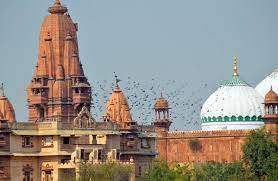
Supreme Court Rejects Plea on Mathura Mosque, Allows Separate Challenge to Religious Rights
05-Jan-2024 | Article by Legal White Official
Issue: Whether Allahabad High Court correctly dismissed PIL seeking recognition of Mathura Mosque site as Krishna Janmabhoomi and mosque removal.
Court: Supreme Court of India (Bench: Justices Sanjiv Khanna & Dipankar Datta)
Petitioner: Advocate Mahek Maheshwari
Key Points:
* Supreme Court refuses to entertain PIL due to ongoing civil suits.
* Petitioner allowed to file separate petition challenging religious rights violation.
* Places of Worship Act constitutionality questioned.
* Mosque committee challenged court-appointed commissioner order in separate appeal.
* Background: Dispute stems from alleged demolition of Krishna temple under Mughal rule.
* 1968 compromise for coexistence now disputed.
On Friday, January 5, the Supreme Court declined to entertain a plea challenging the Allahabad High Court's dismissal of a public interest litigation (PIL) regarding the recognition of Mathura's Shahi Eidgah Mosque site as Krishna Janmabhoomi and the removal of the mosque. The bench, consisting of Justices Sanjiv Khanna and Dipankar Datta, heard a special leave petition filed by Advocate Mahek Maheshwari after the PIL was dismissed in October. Maheshwari had sought the recognition of the disputed site as the actual birthplace of Hindu God Krishna, advocating for the land's transfer to Hindus for the establishment of a trust for Krishna Janmabhoomi Janmasthan.
During the hearing, Justice Khanna informed the petitioner's counsel that the PIL was unnecessary as several civil suits on the same issue were already pending. The counsel expressed dissatisfaction with the high court's dismissal based on the pendency of other suits. Justice Khanna clarified that the petitioner could file a separate petition challenging the vires of any legislation, but not as a PIL.
The Supreme Court pronounced that it was not inclined to interfere with the high court's judgment, dismissing the special leave petition. The court emphasized that the dismissal did not comment on the parties' right to challenge the vires of any enactment.
The Allahabad High Court, comprising Chief Justice Pritinker Diwaker and Justice Ashutosh Srivastava, had rejected Maheshwari's petition, citing pending suits. The petitioner, unsatisfied with the high court's decision, approached the Supreme Court, arguing that it overlooked critical facts and failed to delve into the merits of the case. Maheshwari contended that the PIL defended the fundamental rights of Hindus under Article 25 and 26 of the Constitution.
The petition not only challenged the high court's verdict but also questioned the constitutionality of sections of the Places of Worship Act, 1991. The petitioner sought a court-monitored excavation of the disputed structure by the Archaeological Survey of India and, as an interim measure, requested directions to allow Hindus to conduct prayers at Shahi Idgah Mosque in Mathura on specific days.
In related news, the mosque committee approached the Supreme Court against a December 14 order of the Allahabad High Court allowing the appointment of a court commissioner to inspect the mosque.
The underlying controversy revolves around the Mughal emperor Aurangazeb-era Shahi Eidgah mosque in Mathura, alleged to be built after demolishing a temple at Lord Krishna's birthplace. A compromise agreement in 1968 allowed both places of worship to operate simultaneously, but its validity is now contested in various courts. The litigants argue that the agreement was made fraudulently and is invalid, seeking the removal of the Shahi Eidgah mosque. The Supreme Court had earlier refused to entertain a plea for a scientific survey of the mosque premises, leaving the land dispute questions open for the Allahabad High Court to decide.
